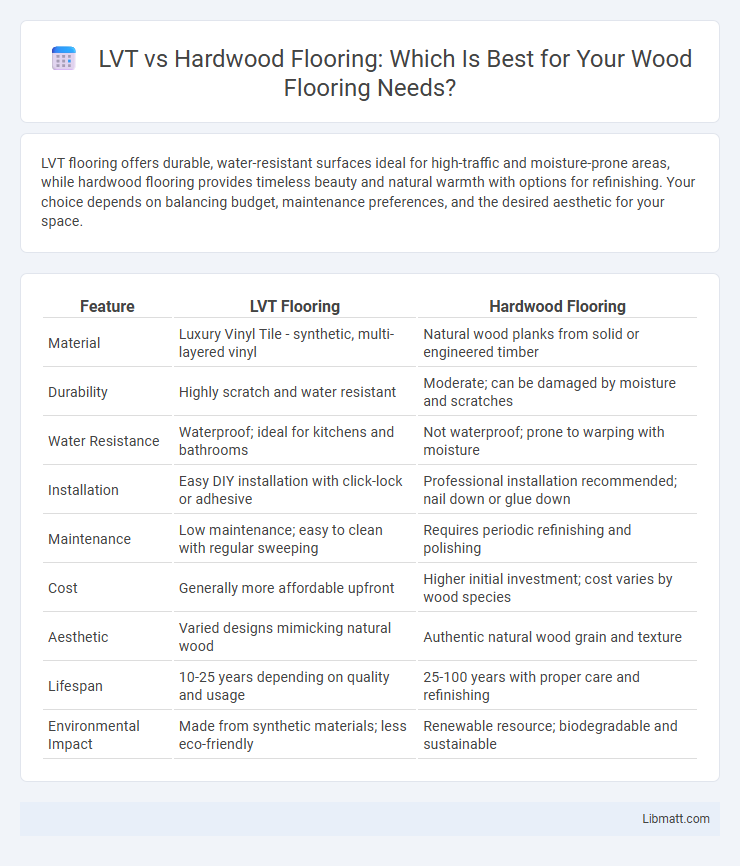LVT flooring offers durable, water-resistant surfaces ideal for high-traffic and moisture-prone areas, while hardwood flooring provides timeless beauty and natural warmth with options for refinishing. Your choice depends on balancing budget, maintenance preferences, and the desired aesthetic for your space.
Table of Comparison
| Feature | LVT Flooring | Hardwood Flooring |
|---|---|---|
| Material | Luxury Vinyl Tile - synthetic, multi-layered vinyl | Natural wood planks from solid or engineered timber |
| Durability | Highly scratch and water resistant | Moderate; can be damaged by moisture and scratches |
| Water Resistance | Waterproof; ideal for kitchens and bathrooms | Not waterproof; prone to warping with moisture |
| Installation | Easy DIY installation with click-lock or adhesive | Professional installation recommended; nail down or glue down |
| Maintenance | Low maintenance; easy to clean with regular sweeping | Requires periodic refinishing and polishing |
| Cost | Generally more affordable upfront | Higher initial investment; cost varies by wood species |
| Aesthetic | Varied designs mimicking natural wood | Authentic natural wood grain and texture |
| Lifespan | 10-25 years depending on quality and usage | 25-100 years with proper care and refinishing |
| Environmental Impact | Made from synthetic materials; less eco-friendly | Renewable resource; biodegradable and sustainable |
Introduction to LVT and Hardwood Flooring
Luxury Vinyl Tile (LVT) offers a durable, water-resistant flooring option designed to mimic the appearance of natural hardwood while providing enhanced resilience and easier maintenance. Hardwood flooring consists of solid or engineered wood planks that bring a timeless, authentic aesthetic and can be refinished multiple times for longevity. Both options vary significantly in cost, installation methods, and suitability for high-moisture environments.
Key Differences Between LVT and Hardwood
LVT (Luxury Vinyl Tile) offers superior water resistance and durability compared to hardwood, making it ideal for moisture-prone areas such as kitchens and basements. Hardwood flooring provides natural warmth and unique grain patterns, creating a timeless aesthetic that can be refinished multiple times to extend its lifespan. Your choice depends on whether you prioritize ease of maintenance and affordability with LVT or the classic beauty and longevity of hardwood.
Durability and Longevity Comparison
Luxury Vinyl Tile (LVT) offers superior durability against scratches, moisture, and heavy foot traffic compared to traditional hardwood flooring, making it ideal for high-activity areas. Hardwood flooring provides longevity through refinishing and repair options, often lasting several decades with proper maintenance. LVT's synthetic composition resists warping and water damage, while hardwood may be susceptible to dents and humidity changes, impacting its long-term performance.
Installation Process: LVT vs Hardwood
LVT (Luxury Vinyl Tile) offers a more straightforward installation process, often featuring a click-lock or glue-down method suitable for DIY projects, requiring minimal subfloor preparation. Hardwood flooring installation typically involves nailing or stapling planks to a wooden subfloor, demanding more expertise and time, especially with solid hardwood that may also need acclimation prior to installation. LVT's moisture resistance allows installation in areas where hardwood might warp, making LVT more versatile for various environments.
Design and Aesthetic Options
LVT flooring offers a wide range of design and aesthetic options, including realistic wood, stone, and tile patterns that closely mimic natural materials with high-definition imaging and textured finishes. Hardwood flooring provides classic, authentic beauty with unique grain patterns and natural color variations that change over time, enhancing its appeal. While hardwood can be refinished multiple times to maintain its aesthetic, LVT provides consistent appearance and durability without the need for refinishing.
Maintenance and Cleaning Requirements
LVT flooring offers superior ease of maintenance compared to hardwood, requiring only regular sweeping and occasional damp mopping without the need for special cleaners or refinishing. Hardwood floors demand more intensive care, including periodic sanding, sealing, and the use of specific wood floor cleaners to avoid warping and discoloration. LVT's water-resistant properties make it better suited for high-moisture areas, reducing the risk of damage from spills and humidity.
Cost Comparison: Upfront and Long-Term
Luxury Vinyl Tile (LVT) typically has a lower upfront cost compared to hardwood flooring, making it an affordable option for budget-conscious homeowners. Hardwood flooring, while more expensive initially, offers higher resale value and durability that can reduce replacement costs over time. Long-term, LVT may incur more frequent replacement or repair expenses due to wear, whereas quality hardwood can last decades with proper maintenance, providing better cost efficiency overall.
Environmental Impact and Sustainability
Luxury Vinyl Tile (LVT) flooring often has a higher environmental impact than hardwood due to its synthetic materials derived from petroleum and challenges in recyclability. Hardwood flooring is considered more sustainable when sourced from responsibly managed forests, offering biodegradability and carbon sequestration benefits. Choosing FSC-certified hardwood or LVT products with recycled content can improve sustainability outcomes in flooring decisions.
Pros and Cons of LVT Flooring
Luxury Vinyl Tile (LVT) flooring offers exceptional durability, water resistance, and ease of maintenance, making it ideal for high-traffic and moisture-prone areas compared to hardwood. LVT provides a more affordable and versatile design range, mimicking natural wood and stone with enhanced comfort underfoot and sound absorption. However, it lacks the authentic aging and refinishing capability of hardwood, and may have a shorter lifespan in comparison.
Pros and Cons of Hardwood Flooring
Hardwood flooring offers timeless beauty, durability, and the ability to be refinished multiple times, making it a long-lasting investment for your home. However, it is vulnerable to moisture damage, can be prone to scratching, and generally comes with a higher upfront cost compared to other flooring options like LVT. Choosing hardwood provides natural warmth and increased property value but may require vigilant maintenance to preserve its appearance.
LVT vs hardwood flooring Infographic

 libmatt.com
libmatt.com